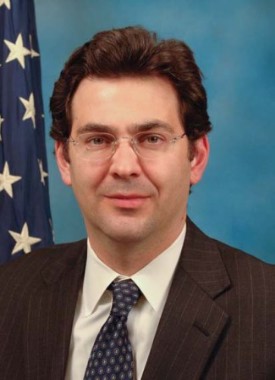User login
Paying Physicians for Value
Starting in 2015, Medicare-participating physicians will be paid in part based on the quality and cost of the care they provide. That’s when the Centers for Medicare and Medicaid Services will begin to apply a value-based modifier to Medicare fee-for-service payments.
Some doctors will be rewarded for providing high-quality, low-cost care, but others will be penalized for low-quality, high-cost work. Those in the middle of the cost and quality spectrum will see no financial impact.
To come up with the value-based modifier, the CMS will begin measuring cost and quality for groups of 25 or more next year, based in part on data reported to the PQRS (Physician Quality Reporting System). Group practices of 25 or more that don’t participate in the PQRS in 2013 will see a 1% Medicare pay cut; those that successfully report will be able to choose between their standard fee-for-service payment or payments adjusted based on quality and cost.
Jonathan Blum and Dr. Patrick Conway of the CMS discussed how the program will work.
QUESTION: Does the timeline for the program mean that all physicians in groups of 25 or more should start participating in PQRS next year, if they haven’t already?
Mr. Blum: Yes, our goals are to encourage participation in [PQRS] and for physician groups to use the information and feedback to improve the care that their patients receive.
QUESTION: The program allows physician groups that successfully participate in PQRS to opt for a 0% modifier rather than take on risk based on quality and cost. Will that option continue?
Dr. Conway: We are seeking comment on whether to continue with this option in future years.
QUESTION: What can physicians do to prepare for this program?
Dr. Conway: Participate in the PQRS, because it makes sense to [do so]. We know the adage that "what gets measured gets done" is true, and PQRS gives physicians and other clinical professionals the opportunity to put administrative practices in place that allow for such performance measurement to take place. Also, participating in PQRS helps physicians avoid a PQRS- and value-based modifier downward adjustment. Lastly, I recommend that physicians review the group feedback report they will receive next year to help inform their decision about whether to elect the value-based modifier.
QUESTION: Is it necessary to have an EHR (electronic health record) to participate?
Mr. Blum: No. Physicians and physicians’ groups can submit data for the PQRS using registries and claims as well. Groups of physicians also can use the Group Practice Reporting Option web interface, which does not require an EHR but can accept data from electronic sources.
QUESTION: When will physicians in small groups be impacted by the value-based modifier?
Mr. Blum: The statute requires [that] the value-based payment modifier cover all physicians by 2017.
QUESTION: Do you think the incentives under the value-based modifier will be significant enough to change how care is delivered?
Mr. Blum: We have started the program cautiously, by providing for a possible 1% negative payment adjustment for low-quality, high-cost care or for failure to satisfactorily participate in PQRS. We’ve also proposed that the biggest payment adjustments go to groups of physicians with high-quality, low-cost care [delivered] to the highest risk patients.
Dr. Conway: As we move forward, we will assess whether and how to adjust the incentives to encourage better care. We believe physician groups will be able to participate in PQRS in 2013 successfully; receive a PQRS incentive payment; avoid the PQRS and value-based modifier downward adjustment; and have the opportunity to elect the value-based modifier for an upward payment adjustment for providing low-cost, high-quality care to their patients.
Mr. Blum is the acting principal deputy administrator and director of the Center for Medicare at the CMS. Dr. Conway is the agency’s chief medical officer and director of the Center for Clinical Standards and Quality.
Jonathan Blum, Dr. Patrick Conway,
Starting in 2015, Medicare-participating physicians will be paid in part based on the quality and cost of the care they provide. That’s when the Centers for Medicare and Medicaid Services will begin to apply a value-based modifier to Medicare fee-for-service payments.
Some doctors will be rewarded for providing high-quality, low-cost care, but others will be penalized for low-quality, high-cost work. Those in the middle of the cost and quality spectrum will see no financial impact.
To come up with the value-based modifier, the CMS will begin measuring cost and quality for groups of 25 or more next year, based in part on data reported to the PQRS (Physician Quality Reporting System). Group practices of 25 or more that don’t participate in the PQRS in 2013 will see a 1% Medicare pay cut; those that successfully report will be able to choose between their standard fee-for-service payment or payments adjusted based on quality and cost.
Jonathan Blum and Dr. Patrick Conway of the CMS discussed how the program will work.
QUESTION: Does the timeline for the program mean that all physicians in groups of 25 or more should start participating in PQRS next year, if they haven’t already?
Mr. Blum: Yes, our goals are to encourage participation in [PQRS] and for physician groups to use the information and feedback to improve the care that their patients receive.
QUESTION: The program allows physician groups that successfully participate in PQRS to opt for a 0% modifier rather than take on risk based on quality and cost. Will that option continue?
Dr. Conway: We are seeking comment on whether to continue with this option in future years.
QUESTION: What can physicians do to prepare for this program?
Dr. Conway: Participate in the PQRS, because it makes sense to [do so]. We know the adage that "what gets measured gets done" is true, and PQRS gives physicians and other clinical professionals the opportunity to put administrative practices in place that allow for such performance measurement to take place. Also, participating in PQRS helps physicians avoid a PQRS- and value-based modifier downward adjustment. Lastly, I recommend that physicians review the group feedback report they will receive next year to help inform their decision about whether to elect the value-based modifier.
QUESTION: Is it necessary to have an EHR (electronic health record) to participate?
Mr. Blum: No. Physicians and physicians’ groups can submit data for the PQRS using registries and claims as well. Groups of physicians also can use the Group Practice Reporting Option web interface, which does not require an EHR but can accept data from electronic sources.
QUESTION: When will physicians in small groups be impacted by the value-based modifier?
Mr. Blum: The statute requires [that] the value-based payment modifier cover all physicians by 2017.
QUESTION: Do you think the incentives under the value-based modifier will be significant enough to change how care is delivered?
Mr. Blum: We have started the program cautiously, by providing for a possible 1% negative payment adjustment for low-quality, high-cost care or for failure to satisfactorily participate in PQRS. We’ve also proposed that the biggest payment adjustments go to groups of physicians with high-quality, low-cost care [delivered] to the highest risk patients.
Dr. Conway: As we move forward, we will assess whether and how to adjust the incentives to encourage better care. We believe physician groups will be able to participate in PQRS in 2013 successfully; receive a PQRS incentive payment; avoid the PQRS and value-based modifier downward adjustment; and have the opportunity to elect the value-based modifier for an upward payment adjustment for providing low-cost, high-quality care to their patients.
Mr. Blum is the acting principal deputy administrator and director of the Center for Medicare at the CMS. Dr. Conway is the agency’s chief medical officer and director of the Center for Clinical Standards and Quality.
Starting in 2015, Medicare-participating physicians will be paid in part based on the quality and cost of the care they provide. That’s when the Centers for Medicare and Medicaid Services will begin to apply a value-based modifier to Medicare fee-for-service payments.
Some doctors will be rewarded for providing high-quality, low-cost care, but others will be penalized for low-quality, high-cost work. Those in the middle of the cost and quality spectrum will see no financial impact.
To come up with the value-based modifier, the CMS will begin measuring cost and quality for groups of 25 or more next year, based in part on data reported to the PQRS (Physician Quality Reporting System). Group practices of 25 or more that don’t participate in the PQRS in 2013 will see a 1% Medicare pay cut; those that successfully report will be able to choose between their standard fee-for-service payment or payments adjusted based on quality and cost.
Jonathan Blum and Dr. Patrick Conway of the CMS discussed how the program will work.
QUESTION: Does the timeline for the program mean that all physicians in groups of 25 or more should start participating in PQRS next year, if they haven’t already?
Mr. Blum: Yes, our goals are to encourage participation in [PQRS] and for physician groups to use the information and feedback to improve the care that their patients receive.
QUESTION: The program allows physician groups that successfully participate in PQRS to opt for a 0% modifier rather than take on risk based on quality and cost. Will that option continue?
Dr. Conway: We are seeking comment on whether to continue with this option in future years.
QUESTION: What can physicians do to prepare for this program?
Dr. Conway: Participate in the PQRS, because it makes sense to [do so]. We know the adage that "what gets measured gets done" is true, and PQRS gives physicians and other clinical professionals the opportunity to put administrative practices in place that allow for such performance measurement to take place. Also, participating in PQRS helps physicians avoid a PQRS- and value-based modifier downward adjustment. Lastly, I recommend that physicians review the group feedback report they will receive next year to help inform their decision about whether to elect the value-based modifier.
QUESTION: Is it necessary to have an EHR (electronic health record) to participate?
Mr. Blum: No. Physicians and physicians’ groups can submit data for the PQRS using registries and claims as well. Groups of physicians also can use the Group Practice Reporting Option web interface, which does not require an EHR but can accept data from electronic sources.
QUESTION: When will physicians in small groups be impacted by the value-based modifier?
Mr. Blum: The statute requires [that] the value-based payment modifier cover all physicians by 2017.
QUESTION: Do you think the incentives under the value-based modifier will be significant enough to change how care is delivered?
Mr. Blum: We have started the program cautiously, by providing for a possible 1% negative payment adjustment for low-quality, high-cost care or for failure to satisfactorily participate in PQRS. We’ve also proposed that the biggest payment adjustments go to groups of physicians with high-quality, low-cost care [delivered] to the highest risk patients.
Dr. Conway: As we move forward, we will assess whether and how to adjust the incentives to encourage better care. We believe physician groups will be able to participate in PQRS in 2013 successfully; receive a PQRS incentive payment; avoid the PQRS and value-based modifier downward adjustment; and have the opportunity to elect the value-based modifier for an upward payment adjustment for providing low-cost, high-quality care to their patients.
Mr. Blum is the acting principal deputy administrator and director of the Center for Medicare at the CMS. Dr. Conway is the agency’s chief medical officer and director of the Center for Clinical Standards and Quality.
Jonathan Blum, Dr. Patrick Conway,
Jonathan Blum, Dr. Patrick Conway,


